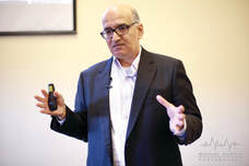|
Ethan Evans is one of the best go-to sources to get an excellent understanding of different jobs you can move into in the tech space. If you want to get ahead in your tech career, you must follow Ethan, listen to his podcast, and watch his YouTube channel. Ethan will guide you on potential technical career paths you may want to pursue, what you have to do to get these jobs, and how to succeed in these jobs. Careers don't just happen; you have to make it happen. Ethan will give you some straight talk that you have to work hard and smart to have a good career in tech. Ethan's tag line on his website (ethanevans.com) is "Sharing what I have learned to help you succeed." He has tremendous credibility in providing great career advice since he has done it all in the technical area. He worked for startups for twelve years and at Amazon for fifteen years, with the last seven years as vice president. He recently retired from Amazon to focus on speaking, coaching, and consulting. What makes Ethan interesting to listen to is his passion for tech and his ability to communicate effectively about different tech jobs. He is a must source for people working in tech jobs and those working in non-tech jobs to understand better the jobs tech people do and connect with them so both tech and non-tech people can exchange ideas and learn about each other's jobs and make the company successful. I learn a lot listening to Ethan's podcasts or his guest appearances on other podcasts. You will too. In this blog post, Ethan was generous in answering five questions about a not well-understood position, but very important for products' success in companies like Amazon--technical program manager. I want to thank Ethan for answering my questions and for all he does to help people. Five questions Q: Can you explain the role of a technical program manager (TPM) as it exists at Amazon? Technical Program Managers (TPM) at Amazon work to make things ship. I think of this in terms of questions.
Of course, no job can be boiled down to a single word, but TPMs focus on what it takes to get a product to release by a particular date. This includes the debates about what should be included in each sprint in an agile environment; the TPM is often the Scrummaster if there is one. It also includes coordinating with other teams to align schedules because rarely is any one team able to launch something major in complete isolation. Responsibilities will always overlap, but the TPM is the main owner of shipping the project on time. Q: What should a new TPM do in the first 90 days to ensure success? At Amazon, the core of early success is "start doing something today." Those who feel they need to sit back and absorb, or who need to test the waters and gain approval before acting, ultimately don't do as well as those who jump in and contribute. This is a challenge for TPMs because, in many ways, the TPM job is less of a "first 90 days" job than many other roles. This is because the TPM is often working on a primary goal that is 6 - 24 months long. But, there are things the TPM can do on day one, such as
This basic loop of understanding blockages and working on them will immerse you in learning and start moving the project towards completion. Through the 90 days, you then must learn the architecture, learn the web of dependent teams and technology, and move up from the daily blockages to the goals and strategy of the project. But the thing you can do on day one is ask a developer, "what do you need today," and go get it for them. By contrast, if you ask a manager, "what meetings can I sit in on to learn, who should I meet, what should I read" you are doing nothing wrong, but you are being less proactive and will earn less respect. Q: What skills you must have to move into a TPM role, and what skills you must develop to be successful? Particularly at Amazon, the T is for technical, so the basic skill required is to have the technical ability. This often means software development ability, but TPMs in other fields, such as hardware, can meet this requirement with skills in those fields. The skills you must develop are in project management (organizing a set of tasks and people to accomplish a goal by a given date), program management (thinking longer-term about the strategic direction of the product or service, not just the current release), and influence (ability to get others to help you hit your goals). The TPM must be good at driving forward progress every single day while also "looking around corners" to anticipate future needs. The best TPMs keep the work of their teams unblocked proactively so that precious developer time is never wasted. They are also very good at getting other teams to do what is needed to support their own team. Q: What kind of jobs people move into after working as a TPM for several years? The most common next move for a TPM is to become a software development manager. In some sense, dev managers need both project and personnel management skills. Becoming a TPM allows the person to break apart the challenge of learning both groups of skills into two steps. As a TPM, they learn project management and influence skills. Then as a dev manager then learn about directly managing people. Some TPMs go in the opposite direction, away from directly building software personally, to become Product Managers. In these cases, the TPM is usually motivated by the desire to have more input into what gets done. They wish to shift from owning the execution of the direction to owning the definition of the direction itself. Overall I think the TPM skill set is a great one. My first real leadership role in my career was as a TPM, though the company did not have that title. When I think of my core skill set, I consider myself to be a TPM to this day, even though I added other skills and responsibilities to that core as I became an executive. The core of my success comes from organizing a group of people to deliver results quickly. Q: Can you explain what you mean by your famous saying, "Results are the Currency of Credibility," and how is it applicable to a technical program manager? When I created the phrase Results are the Currency of Credibility, it was because I realized that people were more likely to listen to someone who had accomplished something meaningful in their sight. Talk is cheap, and lots of smart people have many opinions. One way to differentiate how much weight to give to the opinion is to look at what the person has accomplished, what results they have produced. When I see someone with lots of results, I listen to their ideas and opinions more closely, even if intellectually I may disagree with what I am hearing. I reason, "this person has accomplished great things and has this belief. Though the belief sounds strange to me, perhaps I had better put more effort into understanding what they mean, because it is working for them." For a TPM, the direct application of this phrase is in its influence on others. If they have shipped a lot, their teams will trust their decisions. Other teams, product managers, and development managers will tend to accept what the TPM asserts about their resource needs, schedules, and plans. What I specifically advise people is to make an impact by delivering valuable results before doing too much talking about what you think should change about the team or company. Five Books Recommended by Ethan Evans 1) Decisive: How to Make Better Choices in Life and Work by Chip and Dan Heath 2) Leadership and Self Deception: Getting Out of the Box by The Arbinger Institute 3) The Four Hour Work Week by Tim Ferris 4) I Moved Your Cheese: For Those Who Refuse to Live as Mice in Someone Else’s Maze by Deepak Malhotra 5) Eat That Frog: 21 Ways to Stop Procrastinating and Get More Done with Less by Brian Tracy If you would like to see Ethan's full book recommendations, then please click here. Ethan’s Contact Info: Website: https://ethanevans.com/ Twitch Channel: https://www.twitch.tv/search?term=ethanevans LinkedIn: www.linkedin.com/in/ethanevansvp Twitter: @EthanEvansVP Facebook: https://www.facebook.com/ethanevansvp YouTube Channel: https://www.youtube.com/channel/UC-BAdkBGjOIlccGLZ3jbLiA Ethan Evans’ Podcast: https://podcasts.apple.com/us/podcast/ethan-evans-podcast/id1461708488 TPM Podcast by Mario Gerard in which Ethan was the guest talking about technical account manager role: https://www.mariogerard.com/tpm-podcast-with-ethan-evans/ #####  I am an author, speaker, career success coach. I guide people thrive on high stakes stage whether it's for a job interview, career advancement, a sales presentation or a high-stakes speech. I am the author of a practical book on speaking titled Winning Speech Moments: How to Achieve Your Objective with Anyone, Anytime, Anywhere. The main idea of the book is that if you want people to remember your speech and take action, you must create a winning speech moment. Please download the free speech checklist I created that I always use to create a winning speech for any occasion. Please contact me if you would like to thrive on high stakes stage. You can reach me at [email protected] or 732-847-9877. Note, if you are an author, executive, podcaster or very interesting to talk to and would like me to interview with five questions and then publish it as a blog post and promote it on LinkedIn, Twitter and Facebook, please contact me.
0 Comments
Leave a Reply. |
AuthorJay Oza Archives
July 2024
Categories
All
|
© 2017 Winning Speech Moments


 RSS Feed
RSS Feed